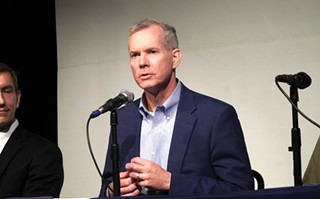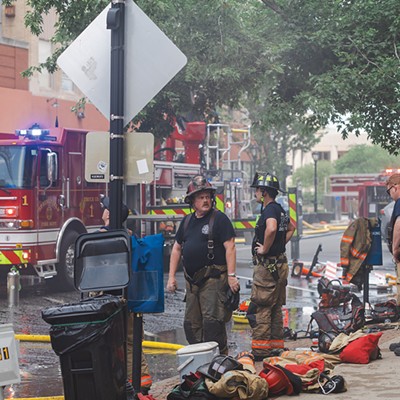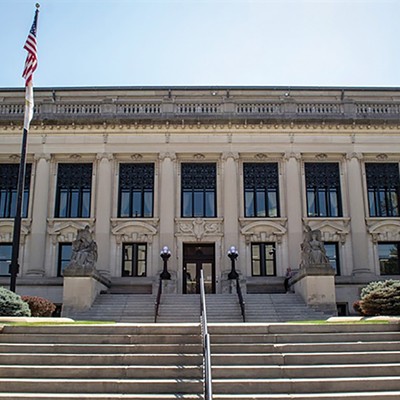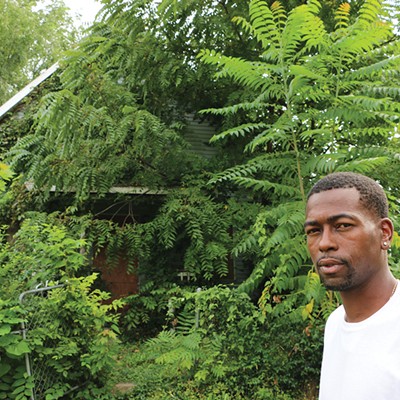Moving Pillsbury Forward, the local nonprofit spearheading efforts to clean up the site of the old Pillsbury flour mill in northeast Springfield, has raised about $4 million towards the estimated $10-12 million cost of demolition and hazardous waste removal. The facility opened in 1929, and at its peak, employed about 1,500 people. It shut down in 2001, 10 years after being acquired by Cargill.
Mismanagement of what was once the largest flour mill in North America by companies which bought it in order to salvage metals has complicated efforts to rehabilitate the 18-acre property, Chris Richmond, president of Moving Pillsbury Forward, told the Citizens Club of Springfield at a March 24 meeting. In addition, asbestos was used in much of the construction of the property over the years due in part to its resistance to fire. The toxic mineral releases microscopic fibers when disturbed, which can lead to diseases such as mesothelioma, lung cancer and asbestosis. Salvage operator Joseph Chernis IV pleaded guilty to illegal removal, demolition and disposal of asbestos in 2018 and was sentenced to 37 months in prison as a result.
According to assistant U.S. Attorney John Holzer, the U.S. Environmental Protection Agency performed emergency remediation in 2017, removing 2,200 tons of debris contaminated with asbestos, but did not remove asbestos in areas that were undisturbed and difficult to access. He noted that other contaminants, such as heavy metals, remain on the property.
Moving Pillsbury Forward was formed in 2020 for the specific purpose of completing remediation of the property to make the site more attractive for redevelopment and took control of the property March 24, 2022, exactly one year before the Citizens Club meeting.
"When we started, the situation looked hopeless, but all of us agreed that hopeless is not acceptable," said Richmond. He said that about 12,000 people live within a one-mile radius of the facility, and cleanup of the site will have a broad, positive impact on the northeast Springfield neighborhood where it sits.
Richmond estimates that remediation will take three to five years and cost upwards of $12 million. During last month's Springfield City Council budget hearings, $2 million was earmarked toward the project in the city's FY 2024 budget. The organization was also awarded $2 million in congressionally directed funds in December 2022.
In spite of the fact that the project has yet to be fully funded, demolition work has already begun and work is progressing in close coordination with the Illinois and U.S. EPAs.
According to Richmond, Moving Pillsbury Forward is committed to increasing citizen involvement in plans for the eventual configuration of the property. The organization continues to hold informational meetings at public venues, and actively seeks volunteers who assist with mowing and cleaning up brush, small trees and litter at the site. Moving Pillsbury Forward also offers guided tours of the facility.
Polly Poskin, vice president of Moving Pillsbury Forward, said that while cleanup of the site involves people from all over the city and beyond, the work most greatly benefits one of the most impoverished neighborhoods in Springfield. In adjacent neighborhoods, "Twenty-five percent of the population does not have a high school diploma, and the median household income is about $25,000," said Poskin. She sees this effort as directly confronting the problem that poor communities are more likely to suffer from a lack of clean water and air and a lack of safe housing. These conditions are often the direct result of industrial facilities' frequent proximity to low-income neighborhoods. According to Poskin, poor residents are rarely at the table when decisions are made about how to deal with industrial sites and the pollutants they produce.
Planning for what to do with the grounds after demolition and remediation is complete is still in the early stages. Richmond mentioned the possibility of a light industrial facility which could take advantage of the railyard alongside the property.
More information about Moving Pillsbury Forward, including a form allowing people to volunteer for the organization, can be found at Pillsburyproject.org.
Don Howard is an intern at Illinois Times while completing his master's degree in Public Affairs Reporting at University of Illinois Springfield. He can be reached at dhoward@illinoistimes.com or 336-455-6966.





















